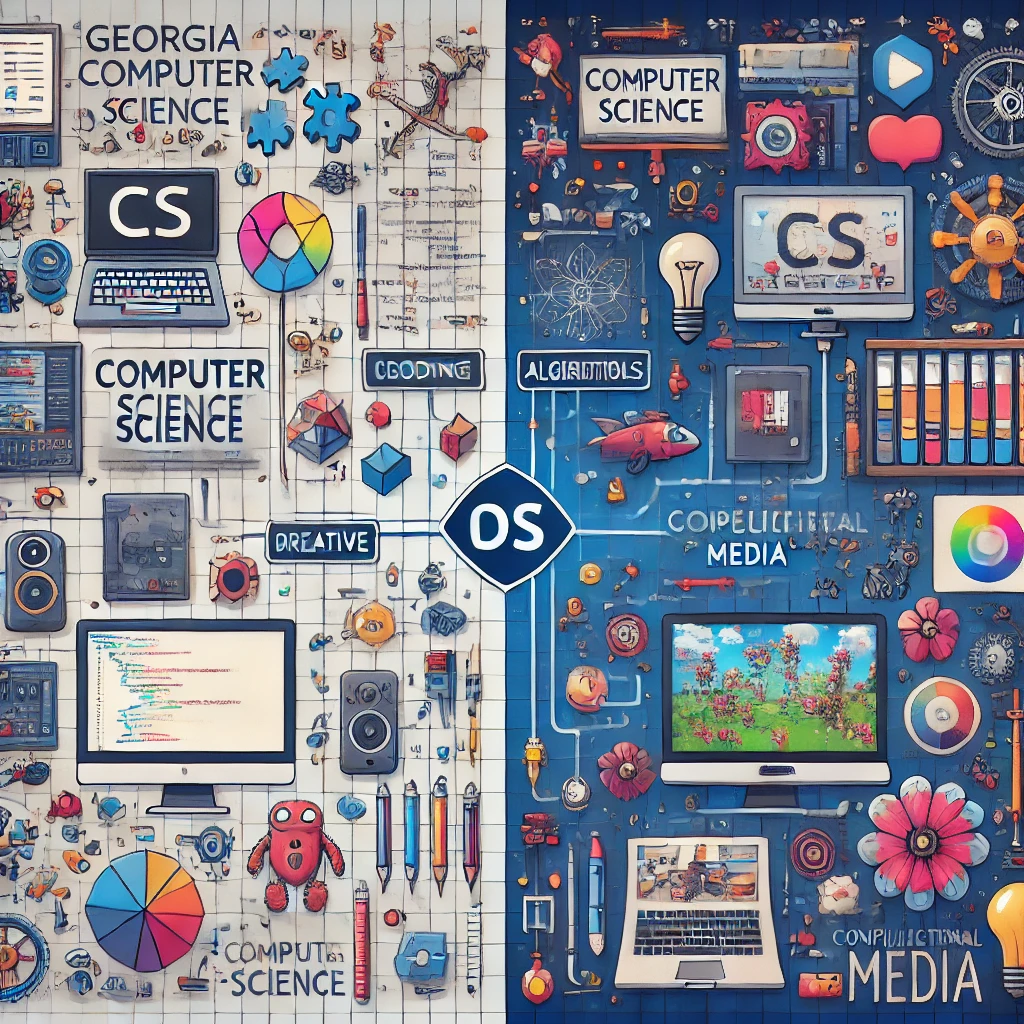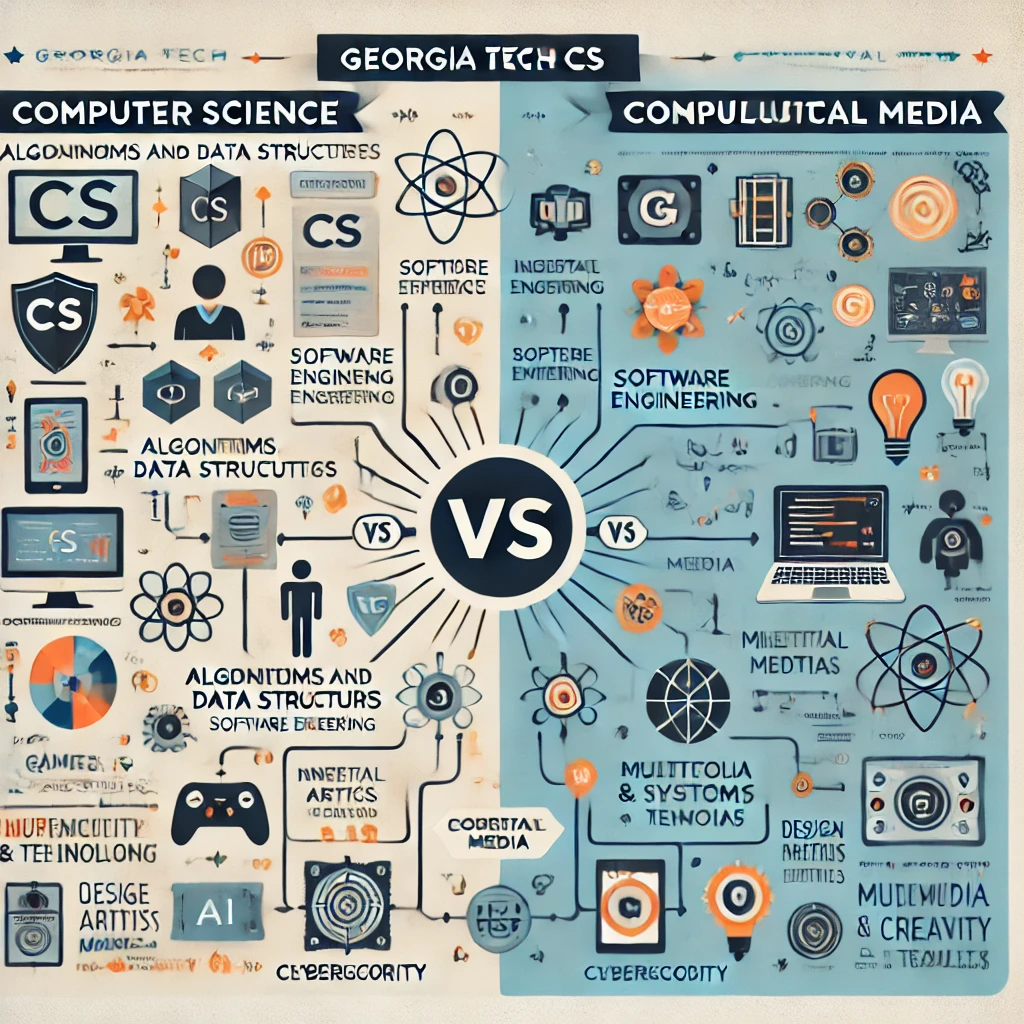- January 7, 2025
Medium Georgia Tech CS vs Computational Media

Medium Georgia Tech CS vs Computational Media: Which Path is Right for You?
When it comes to studying technology and media, Georgia Tech’s Computer Science (CS) program and Computational Media offer two distinct yet complementary fields. Both programs combine technical skills with creativity, but they focus on different aspects of technology, making the choice between them important for aspiring students. In this article, we’ll compare Georgia Tech CS vs Computational Media, exploring key topics in both fields and helping you decide which program aligns with your interests.
Georgia Tech CS (Computer Science) Overview
The Computer Science (CS) program at Georgia Tech is deeply focused on the theoretical and practical aspects of computing. Students in this program acquire a strong foundation in algorithms, data structures, and software engineering, preparing them for a wide range of careers in the tech industry. The program covers both foundational topics and specialized areas like Artificial Intelligence (AI), cybersecurity, and computer networks, equipping students with the tools to tackle complex computational problems.
Core Topics in Georgia Tech CS
- Algorithms and Data Structures: These are essential for solving problems efficiently, and understanding them is key to writing high-performance software.
- Software Engineering: Focuses on the systematic development of software, including methodologies like Agile and Scrum.
- Artificial Intelligence (AI): AI topics such as machine learning, natural language processing, and computer vision are explored in-depth.
- Cybersecurity: This covers encryption, data protection, and ethical hacking to secure systems against attacks.
- Human-Computer Interaction (HCI): Designing user-friendly interfaces and understanding how people interact with technology.
- Computer Networks: Teaches the fundamentals of networking protocols, cloud computing, and distributed systems.
The CS program is ideal for those who enjoy problem-solving, working with abstract concepts, and diving deep into technology to create software systems and solutions.
Computational Media Overview
On the other hand, Computational Media at Georgia Tech is an interdisciplinary program that bridges the gap between computing and creative fields. It focuses on the intersection of media, technology, and design, with a special emphasis on how these areas can be combined to create innovative digital experiences. Students in this program use computational tools to design and develop games, animation, interactive media, and other digital forms of artistic expression.
Core Topics in Computational Media
- Game Design and Development: Learn to create interactive games using game engines like Unity and Unreal Engine.
- Digital Arts and Animation: Focuses on creating digital art, 3D modeling, and animation techniques.
- Interactive Media: Develop media that responds to user inputs in real-time, such as virtual reality (VR) and augmented reality (AR) experiences.
- Multimedia Systems and Technologies: Explores technologies behind video and audio editing, streaming, and interactive systems.
- Design and Creativity Tools: Proficiency in tools like Adobe Creative Suite, 3D Max, and Blender for creating media content.
- Computational Creativity: Delves into algorithmic art and generative design, blending creativity with computation.
The Computational Media program is for students who are passionate about combining creative arts with technology to produce media-rich experiences. It suits those interested in animation, game design, and digital arts.
Key Differences Between Georgia Tech CS vs Computational Media
While both programs incorporate technology and creative problem-solving, they differ in their focus and objectives:
- Georgia Tech CS is more technical, emphasizing foundational programming skills and theoretical computer science. It’s a great fit for those interested in developing software, creating algorithms, and solving technical problems.
- Computational Media, on the other hand, is more focused on creativity and media production, combining computer science with artistic and design concepts. It’s ideal for those who wish to work in fields like game development, digital arts, and interactive media.
Interdisciplinary Topics to Explore
Both fields also offer opportunities to explore interdisciplinary topics, which blend aspects of both technical and creative domains. These include:
- Human-Centered Computing: Focuses on designing technology that improves user experience and solves real-world problems.
- Data Visualization: Helps present complex data through compelling and easy-to-understand visuals.
- Ethics in Technology and Media: Explores the ethical implications of emerging technologies, including issues like privacy, AI, and digital media manipulation.
Which Program Should You Choose?
If You Love Pure Technology and Problem-Solving:
Choose Georgia Tech’s CS program. If you enjoy tackling complex problems, working with algorithms, and creating efficient software solutions, this program will provide the in-depth technical foundation you need. It’s also a solid choice if you’re aiming for a career in software development, cybersecurity, or AI.
If You Are Creative and Interested in Digital Media:
Opt for Computational Media. If your passion lies in combining technology with creativity—whether through game design, digital arts, or interactive media—this program offers the perfect balance of technical skills and artistic expression. It’s well-suited for those who want to work on immersive media experiences like VR, animation, or interactive storytelling.
Conclusion: Medium Georgia Tech CS vs Computational Media
In conclusion, the decision between Georgia Tech CS vs Computational Media depends on your personal interests and career aspirations. If you’re inclined towards the technical side of computing, Computer Science is a great option. If you’re drawn to the intersection of creativity and technology, then Computational Media may be the right fit for you. Both programs offer unique opportunities to innovate, and your choice should reflect what excites you most about technology and its role in the world.